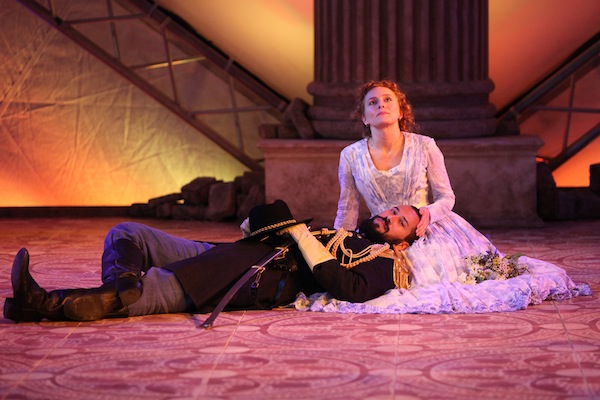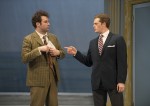The company of Bard on Beach’s production of Midsummer Night’s Dream. (photo by Tim Matheson)
The thespian delights of Shakespeare set against the glorious backdrop of mountains, sea and sky have been missed. But now, after a COVID-induced two-year hiatus, Bard on the Beach at Vanier Park is back with a bang, based on the audience buzz on opening night.
The comedy A Midsummer Night’s Dream, a perennial crowd pleaser, will occupy the BMO Mainstage all season. Harlem Duet, a tale of Black life spanning three periods in American history, runs until mid-July on the smaller Howard Family Stage, with Romeo and Juliet taking over that stage in August through to September.
This is the seventh time Bard has produced A Midsummer Night’s Dream, and this rendition has “hit” written all over it. It is one cheeky dream.
Set against the backdrop of the upcoming marriage of Athenian Duke Theseus (Ian Butcher) to foreign Queen Hippolyta (Melissa Oei), three stories weave their way through a mélange of mistaken identities, unrequited love, feuding fairy royalty and would-be actors, riotously intersecting in the enchanted wood outside of Athens.
Four young lovers, Hermia (Heidi Damayo), Lysander (Olivia Hutt), Helena (Emily Dallas) and Demetrius (Christopher Allen) dash through the woods in a mad, “looking for love romp” replete with a WWE-worthy cat fight and zingy insults.
Meanwhile, in the sylvan wonderland, Fairy King Oberon (Billy Marchenski) and his queen, Titania (Kate Besworth), are in the midst of a custody battle. Oberon sends his trusty servant, the mischievous Puck (Sarah Roa), to exact revenge on his queen with a potion meant to make her fall in love with the first thing she sees when she awakes.
Finally, we meet a troupe of bumbling tradesmen who seek refuge in the forest to rehearse Pyramus and Thisbe, the play they have written in honour of the duke’s pending nuptials. It is during this rehearsal, that one of them, Bottom (Carly Street), morphs into an ass, both literally and figuratively, and becomes the love interest of Titania.
In a nod to diversity and gender fluidity, director Scott Bellis (who knows this play from top to bottom, having performed in five of Bard’s previous Midsummer productions) has cast lovers Hermia and Lysander as a lesbian couple, while two of the tradesmen, Bottom and Snug (Jewish community member Advah Soudack), are played as females.
Bellis has also incorporated some interesting staging devices. Oberon arrives on stage on stilts, towering over his subjects. Bottom makes numerous asides to the audience and takes forays up the aisles. And the Mechanicals characters, at one point, move in a shuffling turntable motion around the stage.
Street steals the show as Bottom, the know-it-all of the working class group. Although given the lead of Pyramus, she wants to play all of the parts, thinking she can act better than the others. In her quest to prove this, she gives whole new meaning to the concept of emoting. It generally works and the audience loves it, although she often upstages her castmates.
Roa provides a refreshing spin on her impish character and Soudack, although in a minor role, is hilarious as the timid lion in Pyramus and Thisbe, as is Flute (Munish Sharma) as Thisbe, the reluctant object of Pyramus’s affection. Many of the actors are making their Bard debut and it is good to see new blood in the Vancouver theatre scene.
Jewish community members are prominent behind the scenes in this production. Amir Ofek’s set, backed by two leaded glass windows framing the view of the North Shore, easily transitions from the staid royal Athenian court to the warehouse of the tradesmen to the whimsy of the Oberon realm. Mishelle Cuttler, as sound designer/composer, provides original music that complements Tara Cheyenne Friedenberg’s ethereal choreography, as performed by students from the Simon Fraser University School of Contemporary Dance. You don’t usually get to see Shakespeare with so many dance elements, which adds an interesting layer to the mix.
Christine Reimer’s costumes are a delight – earth-toned, tailored day suits and cloche hats for the women, a white bejeweled gown for Titania, frothy candy-coloured tutus for the fairies and silky evening frocks for the final scene. Gerald King’s lighting – the greens, the purples, the reds – all work in harmony with the sun as it sets behind the stage.
To escape into the Bard’s fantasy world and enjoy the dream, visit bardonthebeach.org.
Tova Kornfeld is a Vancouver freelance writer and lawyer.




